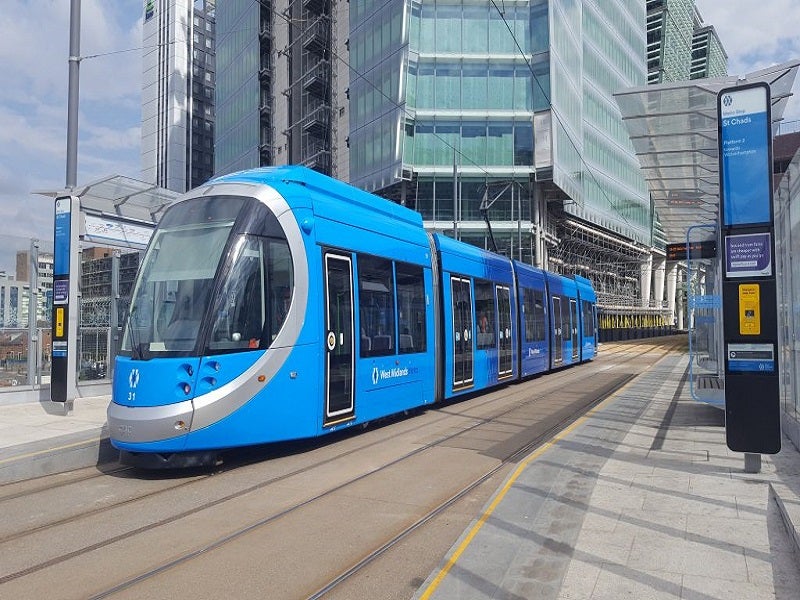Birmingham westside metro extension is a 2.15km expansion of the West Midlands Metro in Birmingham, UK.
The extension will connect the city centre with the west of Birmingham and is the first m#etro system in the country to operate independently on battery power throughout.
It follows the extension of the West Midlands Metro from St Chads to Grand Central, connecting metro services from Grand Central to Centenary Square, Five Ways, Broad Street, and Hagley Road.
The project is being undertaken by the Midland Metro Alliance (MMA), which is a consortium established by Transport for West Midlands (TfWM) to implement a series of tram extensions. TfWM is part of the West Midlands Combined Authority (WMCA), which owns the West Midlands Metro.
The Birmingham westside metro extension is being undertaken in two phases. Phase one was commissioned in December 2019 while phase two is expected to be completed in the fourth quarter (Q4) of 2021.
The project is being developed with an investment of £149.2m ($186.4m), including £65.8m ($82.2m) for the first phase and £83.4m ($104.2m) for the second phase.
Phase one of Birmingham westside metro extension
Phase one of the extension is an 840m-long line connecting Grand Central with Centenary Square, via Birmingham’s Town Hall. The catenary-free route has two stops serving Victoria Square and the Paradise and Arena Central developments.
Construction for phase one began in June 2017 and the laying of tram tracks in the city centre began in February 2019.
A series of tram trials were conducted at Victoria Square in August 2019, followed by full tests undertaken in Centenary Square beginning in October 2019. The trams were put through overnight trials across the newly laid tracks from Grand Central to Centenary Square.
The phase one route became the first in the UK to fully operate on battery power. Metro operation on battery power eliminates the requirement of fixing electric wires to the listed buildings along the route and cuts carbon footprint. It allows passengers to reach the Library of Birmingham, Birmingham Rep, Symphony Hall, International Convention Centre (ICC), the Council House and Town Hall and offices in Centenary Square and Victoria Square.
The frequency of service on the route is once every six minutes during peak hours. The service can also be used to reach attractions such as the German Christmas market, ice rink, and a big wheel in the city centre.
Phase two (Library to Edgbaston) details
The 1.3km-long route under phase two will have three stops along Brindleyplace, Five Ways, and the terminus on Hagley Road.
The second phase will extend the route from the Library tram stop in Centenary Square to a terminus just west of Five Ways at Hagley Road in Edgbaston.
Construction for phase two began in January 2019 with works for the Broad Street canal tunnel strengthening.
Construction at Broad Street progressed to the city centre underpass as of June 2019 and the first tracks in this section were laid in December 2019.
The project authorities undertook several highway measures to handle additional traffic on nearby streets when the access to the main routes is made available only to public transport. The utilities along the section were also upgraded and diverted to facilitate construction activities.
The track laying of the project was completed in April 2021 with the final piece of track welded into place on Hagley Road. The final stages of construction include street improvements and overhead line equipment installation. The overhead wires will power the trams in some sections of the route.
A new purpose-built substation building at Five Ways island is under construction as of October 2021, with a substation unit set to be installed in the coming weeks.
The route is expected to be ready for the 2022 Commonwealth Games. West Midlands Metro also plans to expand its fleet under its catenary-free Third Generation Tram procurement programme.
Birmingham westside metro extension benefits
The project will save journey time of passengers in the area and reduce congestion. It will improve accessibility to and from the west of Birmingham and provide better connectivity to job locations. The extension will increase sustainable transport options in the city centre while supporting plans to regenerate the region. Other benefits include reduced noise and better air quality.
West Midlands metro expansion details
West Midlands metro currently serves Birmingham city centre at the Library terminus in Centenary Square, and the metro network is expected to triple in size by 2026.
The westside extension is part of its £1.35bn ($1.76bn) expansion with new lines serving Birmingham, the Black Country and Solihull.
Other extensions under the WMCA’s plans include Wolverhampton City Centre metro extension, Wednesbury to Brierley Hill metro extension, Wednesbury to Brierley Hill metro extension, Birmingham Eastside metro extension, and East Birmingham to Solihull metro extension.
Key players involved
In addition to WMCA, the MMA includes a consortium of design experts from Egis, Pell Frischmann and Tony Gee, along with Auctus Management Group, Barhale, Thomas Vale, Colas Rail, and Colas.






